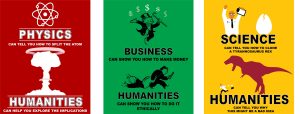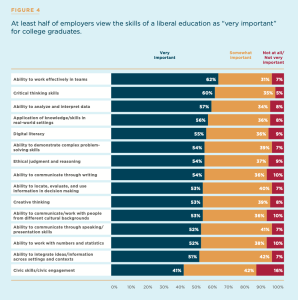Why Humanities?
As a college student, you will spend time learning from a variety of instructors on varied topics including math, science, and the Humanities, but what are the Humanities?
The Humanities are academic disciplines that study human society and culture. Unlike the sciences, which often focus on empirical data and quantitative research, the Humanities explore the characteristics of the human experience. In essence, the Humanities examine what it means to be human and the classes you take at CNM will ask you to consider the various facets of our humanity and culture, such as: language, literature, philosophy, history, religion, etc.
And this interest in our humanity is not new or distinctly a product of the Western World by any stretch of the imagination. Confucianism, for example, was founded around the 6th century BCE, and remains the social code of the Chinese. The concepts of mindfulness and meditation, so popular among humans in the 21st century, find their roots in Hinduism, dating back more than 4000 years. The Maya civilization existed from antiquity and is still widely studied for their art, the development of their writing system, and their complex belief systems.
Our contemporary understanding of the Humanities in the Western World has its beginnings in Classical and Ancient Greek culture and thought. The concepts of history, philosophy, and drama have their origins in Greek culture and the understanding and training in these areas, along with rhetoric, mathematics, astronomy, and music was fundamental to one’s educational development to be a good citizen and to reach one’s full potential and personhood. These concepts remain important to our lives as they encompass what we are capable of and they help us to ask and to answer the questions of our lives. Such as, who really was Jack the Ripper?
But seriously— the Humanities are vital because they allow us to “gain access to the laboratory of human experience.”[1] Your Humanities courses will encourage you to question and try to answer things like: What does it mean to be human? What is truth? What is justice? Why do we as a species commit genocide or crimes against humanity? How have we evolved and changed over time? What motivates our behavior? What is the “good” life? How do we communicate with each other? How do we find belonging and connection? What does life mean?
Many would argue the Humanities are the reason why we are storytellers and critical thinkers. As the Stanford Humanities Center notes, “Investigating a branch of philosophy might get you thinking about ethical questions. Learning another language might help you gain an appreciation for the similarities in different cultures. Contemplating a sculpture might make you think about how an artist’s life affected her creative decisions. Reading a book from another region of the world might help you think about the meaning of democracy. Listening to a history course might help you better understand the past, while at the same time offer you a clearer picture of the future.”[2] As humans, our curiosity thrives in the Humanities where we can contemplate these topics.

As the University of Utah so succinctly demonstrated with their advertisement campaign for the Humanities, “Physics can show you how to split the atom. Humanities can explore the implications. Science can tell you how to clone a Tyrannosaurus Rex. Humanities can tell you why that is a bad idea.”[3] University of Utah College of Humanities.
Right now, we live in a time of much uncertainty and division. During times like these, learning about our past and understanding the world around us and understanding ourselves is imperative. The Humanities help us navigate our ever changing world.
Are the Humanities Important Outside of Academia?
Absolutely! You will continue to use the Humanities skills you hone in college in your career, in your personal life, and in conversations with your friends. We would wager that most of us who study the Humanities do so, in part, for the fun of it. Humans, by and large, are fascinated by other humans.
One example of this interest is the explosion of the true crime genre in popular culture. “A Pew Research Center Study from April 1 to Sept. 30, 2022, indicates true crime is the most common podcast topic, and 24 percent of the 451 top-ranked podcasts in the United States across Apple Podcasts and Spotify are about true crime.”[4] Countless Netflix documentaries, Youtube videos, TikToks, and Reddit communities are dedicated to the dissection of crime scenes, profiles of serial killers, and alternate perpetrator theories. And while consuming this content clearly showcases the demand for science and technology skills (blood spatter analysis, ballistics, and fingerprinting, for example), a complete understanding of true crime case studies would be impossible without the Humanities.
Consider the study of history in terms of true crime. We cannot truly understand the cult of Charles Manson without understanding the context in which he lived and gained followers. Similarly, an academic who puts forth a theory about Jack the Ripper needs to recognize the role of social class and the street conditions that allowed the Ripper to move about freely and undetected in London.
We can also look at the role of language in true crime. The Unabomber, Ted Kaczynski, was identified by an English professor who analyzed his manifesto using forensic linguistics. Pop culture studies might consider the fact that most people are more likely to know the name of a murderer than the name of any of their victims, and draw conclusions around our cultural relationships with violence or gender. The Humanities encourages people to examine the use of passive voice in crime reporting and how it shifts blame onto the victims of crime and away from perpetrators.
Finally, we should consider the more recent conversations surrounding the ethical implications of true crime reporting and consumption. Much true crime media has been criticized for the invasion of privacy of victims and their families. Criminal investigations have been compromised by the media’s revealing of confidential information and for contamination of witnesses. And most problematically of all, much true crime reporting happens without the consent of the people most affected by the tragic circumstances conveyed.
All of these examples, and many more, center Humanities skills, and demonstrate the importance of considering the human in the study of all things.
Humanities in the Workforce
Now that we know that Humanities skills are broadly transferable, we can focus on the benefits of these skills in the workforce. A 2024 Forbes article titled “84% Of Workforce Insists Job Candidates Must Demonstrate Soft Skills, New Study Finds” argues that durable, or soft, skills are essential in the workplace. But what are durable skills? Durable skills are non-technical skills that relate to how you work and interact with others. These skills are crucial for building relationships, gaining visibility, and creating opportunities, and they are often highly valued by employers, which is further described in the following graph. Clearly, these skills are anything but soft, and you are honing them in each of your Humanities courses.

The durable skills that employers desire are vital in the workplace because they enhance collaboration, communication, and critical thinking. The Association of American Colleges and Universities Report, “How College Contributes to Workforce Success: Employer Views on What Matters Most”, explains “that a liberal education — or preparation for more than a specific job — provides knowledge and skills that are important for career success.”[5] Matt Sigelman, CEO of Burning Glass Technologies, a labor market and job skills analytics software firm asserts that “Jobs that are the ‘most data-driven and technology-enabled actually request more liberal arts skills than the average job,’ he continued. These jobs are 50 percent more likely to require writing, 50 percent more likely to request research skills and 40 percent more likely to ask for problem solving, for instance.”[6]. AAC&U survey finds employers want candidates with liberal arts skills but cite “preparedness gap.”[7] These studies support the benefits of both technical and non-technical skills. The work you are doing as a college student will have a direct impact on your career readiness.
The next time you are registering for a Humanities class, we hope you will think about the benefits of these courses and the opportunity they give you to ask the important questions.
Barnes, Megan, Bethany Heinrich, and Tammy Wolf. “Why Humanities.” Introduction to College Writing at CNM. 2025.
- “Why Study History?” by Peter N Stearns. file:///Users/blueberry/Downloads/2.1.1_Why_study_history_Peter_N_Stearns_1998%20(4).pdf https://www.historians.org/about-aha-and-membership/aha-history-andarchives/historical-archives/why-study-history-(1998) ↵
- Why do the humanities matter? Stanford University (https://www.montgomerycollege.edu/_documents/special-programs/global-humanities-institute/why-do-the-humanities-matter.pdf) ↵
- https://medium.com/@Ahaverine/5-things-i-learned-by-leaving-academic-research-5ae10d7bd8de ↵
- Richards, E. (2023, July 14). True Crime: insight into the human fascination with the Who-Done-It. Social Science Space. https://www.socialsciencespace.com/2023/07/true-crime-insight-into-the-human-fascination-with-the-who-done-it/ ↵
- Flaherty, C. (n.d.). AAC&U survey finds employers want candidates with liberal arts skills but cite “preparedness gap.” Inside Higher Ed | Higher Education News, Events and Jobs. Flaherty, C. (n.d.). AAC&U survey finds employers want candidates with liberal arts skills but cite “preparedness gap.” Inside Higher Ed | Higher Education News, Events and Jobs. https://insidehighered.com/news/2021/04/06/aacu-survey-finds-employers-want-candidates-liberal-arts-skills-cite-preparedness ↵
- Flaherty, C. (n.d.-a ↵
- Inside Higher Ed | Higher Education News, Events and Jobs. https://www.insidehighered.com/news/2021/04/06/aacu-survey-finds-employers-want-candidates-liberal-arts-skills-cite-preparedness ↵

